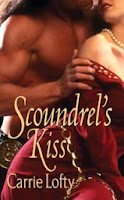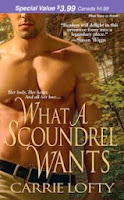We're especially pleased to welcome author Carrie Lofty, who chats with us about the road to publication and her newest release, Scoundrel's Kiss, from Kensington Zebra, January 2010.
GUEST AUTHOR CARRIE LOFTY
Aside from my family, including my fantastic husband of twelve years and our two precocious daughters, the love of my life is history. I started out at age ten when I investigated the plot to assassinate Lincoln. My father, who had been reading about the Civil War for years, admitted that I knew more about the plot than he did. That thrill—knowing pieces of the past that no one else did—became an obsession.
But oh, then came puberty. I fell hard for the early-90s melodrama "The Young Riders," which fictionalized the lives of pony express riders. Hot guys! Plus history! Plus...a hint of romance! I couldn't help it. My impression of history from that point on became ever-so-slightly rose colored. Discovering historical romances round about that same time didn't help me overcome what would eventually become my creative destiny.
After earning a bachelor's in English and history, then a master's in history, I returned to my rosy roots and began pursuing a career in romantic fiction.
Ever since, I've been in conflict with myself. Historical romance is...*gasp*...genre fiction! How could I justify bending and twisting history to meet my own ends as a storyteller? For years I wrestled with this issue. My ability to create a great romance, however, suffered. I needed to give myself permission to be a novelist first, then an historian.
This process of giving myself permission came to fruition when I wrote my debut novel, WHAT A SCOUNDREL WANTS. Because of its Robin Hood theme, I could be a little…creative. After all, very little is actually known about the man who may have once been Robin Hood. Most of the stories that have come about are just that: stories. So grounding my romance within the bounds of a legend--not hard history--was the perfect step-down from my days as a hardcore researcher!

Then I got the hang of it! I can be factual and engaging. It can be done. In my latest medieval romance, SCOUNDREL'S KISS, I took inspiration from fact and then wove it into my fiction. For example, the town of Uclés, where much of SCOUNDREL'S KISS is set, was frequently attacked, besieged, and fractured by conflicting monastic leadership. I chose to portray that Uclés was safe from harm throughout the course of this novel, and I simplified the power struggle immensely. Why? Because for the purposes of the romance, all of those interesting mechanizations weren't necessary. I loved reading about it--the historian in me--but that doesn't mean everyone else will!
To my way of thinking, I've remained true to the period and the culture while still giving my readers exactly what they want: a compelling romance. After all, those who get interested in the history will go investigate on their own. That's what I did with "The Young Riders," and look where it got me!
Carrie Lofty is the author of sexy, adventurous historical romances, including her Robin Hood-themed debut,
WHAT A SCOUNDREL WANTS. Her latest,
SCOUNDREL'S KISS, in which a warrior monk must resist the troubled woman he's sworn to protect, hits the shelves this month.
This June, Carrie's Austrian-set tale of two lovelorn musicians will launch Harlequin's Carina Press. And coming soon from Penguin are three hot-n-dirty apocalyptic romances, co-written with Ann Aguirre under the name
Ellen Connor.
Thank you, Carrie, for visiting with us! Remember to leave a comment to win a copy of Scoundrel's Kiss.
















